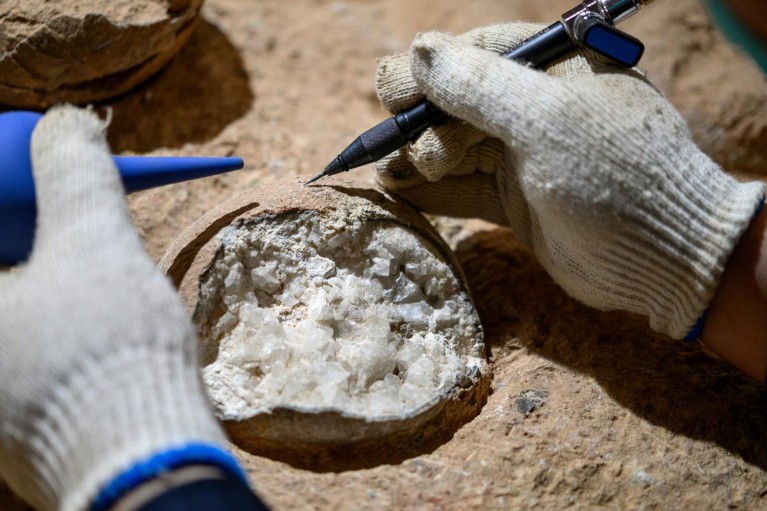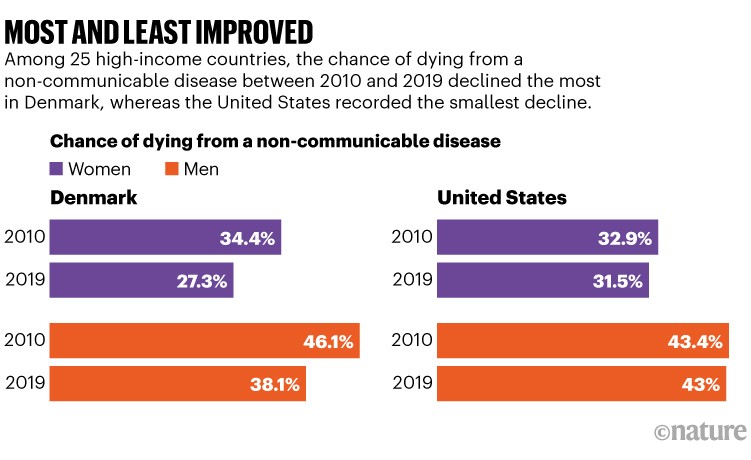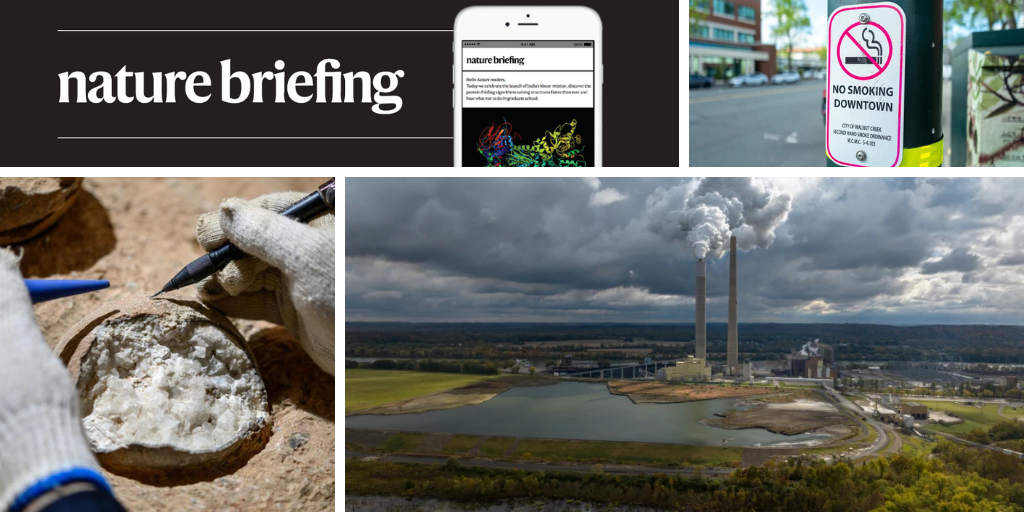You have full access to this article via your institution.
Hello Nature readers, would you like to get this Briefing in your inbox free every day? Sign up here.

Numerous dinosaur eggs have been found in Shiyan, China, but their age has been unknown until now.Credit: Dr. Bi Zhao
Scientists have calculated the age of a fossilized dinosaur egg from analysing the minerals deposited on the surface during fossilization (it’s around 85.9 million years old). This is the first time a dino egg has been dated directly, rather than relying on indirectly dating the volcanic ash or rock layers in which the specimens are embedded. “This will remove the uncertainties associated with the ages of many fossils,” says palaeontologist Guntupalli Prasad. However, the study did not account for the processes that occur between the egg’s burial and fossilization, notes palaeontologist Susannah Maidment.
Reference: Frontiers in Earth Science paper
The chance of dying from non-communicable diseases such as heart disease, cancer and diabetes before the age of 80 declined in roughly 150 countries between 2010 and 2019. Some of the biggest drivers of improvements in death rates were the adoption of medications that lower the risk of heart attacks and the development of vaccines for hepatitis and cervical cancer, says public-policy specialist Veronica Le Nevez. But the news could be better — more than half of the countries saw slower declines in the 2010s compared with the previous decade.
Reference: The Lancet paper

Source: Ref. 1
Faced with a lawsuit, the administration of US President Donald Trump has disbanded a panel of five well-known critics of climate science who issued a controversial draft report that casts doubt on the evidence underlying global warming. The document serves as the scientific basis of the Trump administration’s efforts to repeal a landmark 2009 finding that greenhouse gases endanger public health and welfare — which could ultimately prevent the Environmental Protection Agency from regulating those emissions. The Department of Energy has declined to withdraw the report, although observers note that disbanding the panel could further undermine the report’s legitimacy.
Features & opinion
To develop a cure for HIV, researchers need to pinpoint the nooks and crannies where the virus hides itself from antiretroviral therapies. That goal inspired Last Gift, a unique clinical study that aims to perform autopsies on the bodies of people with HIV within hours of their death, which could let researchers locate the virus before any kind of decomposition ousts it from its hiding places. The protocol of Last Gift — which has performed 42 rapid autopsies so far — was vetted and approved by a HIV community advisory board, but others have raised objections. Jules Levin, the director of National AIDS Treatment Advocacy Project, questions whether people facing death are in the right state of mind to consent, and whether the use of their cadavers will translate to meaningful progress.
Abandoned robots long to be laid to rest in The earth will not consume our bones and a man finds an unexpected message from his late mother in Maintenance.
Nature | 7 min read & Nature | 6 min read
A new book for organizations seeking to contribute to regenerating the environment, titled Becoming Nature Positive, is “ambitious, timely and comprehensive guide”, writes reviewer Ryan Nolan, who studies corporate sustainability and systemic change. “What distinguishes this compilation from many others is its refusal to promise simple solutions, instead acknowledging the complexity and scale of change required across business, finance, policy and society at large.”
Around one-quarter of the heatwaves recorded over 2000–23 have been linked to the greenhouse-gas emissions of individual countries, industries and major fossil-fuel companies. The findings could provide fresh evidence to support lawsuits seeking to hold polluters accountable for their impacts on the climate. “They are able to say, [for example], Exxon Mobile contributed this number of degrees to this heatwave which happened in 2021 in the Pacific Northwest and they made it more than 10,000 times more likely,” explains senior reporter Jeff Tollefson.
Nature Podcast | 37 min listen
Subscribe to the Nature Podcast on Apple Podcasts, Spotify or YouTube Music, or use the RSS feed.
Today Leif Penguinson is having fun at the Sally May Recreation Site on Fossil Creek just north of Phoenix, Arizona. Can you find the penguin?
The answer will be in Monday’s e-mail, all thanks to Briefing photo editor and penguin wrangler Tom Houghton.
This newsletter is always evolving — tell us what you think! Please send your feedback to [email protected].
Thanks for reading,
Flora Graham, senior editor, Nature Briefing
With contributions by Jacob Smith
• Nature Briefing: Careers — insights, advice and award-winning journalism to help you optimize your working life
• Nature Briefing: Microbiology — the most abundant living entities on our planet — microorganisms — and the role they play in health, the environment and food systems
• Nature Briefing: Anthropocene — climate change, biodiversity, sustainability and geoengineering
• Nature Briefing: AI & Robotics — 100% written by humans, of course
• Nature Briefing: Cancer — a weekly newsletter written with cancer researchers in mind
• Nature Briefing: Translational Research — covers biotechnology, drug discovery and pharma


